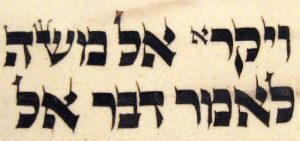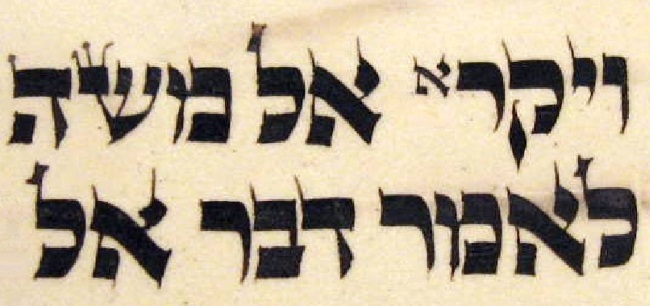
Sefer Vayikra begins with the pasuk “He called to Moshe and Hashem spoke to him from the Ohel Moed saying:” [Vayikra 1:1]. The Aleph of the word VaYikra (He called) is written with a small letter. According to Chazal, this was at Moshe Rabbeinu’s insistence because the word Vayikra connotes endearment. It showed the love of the Ribono shel Olam for Moshe and so Moshe in his great humility wanted to lessen the effect of this word. Therefore, this Aleph is called an Aleph Zeira (a small Aleph), in deference to the humility of the great prophet.
I saw a question raised by Rav Schach, zt”l. A famous Gemara [Menachos 29b] says that Rabbi Akiva was able to expound “piles and piles of laws over each and every ‘crown’ of the letters in the Torah.” We are not privy to these drashas that Rabbi Akiva made over these special strokes that crown certain letters of the Torah, but Rabbi Akiva inferred laws from those “tagim.”
If Rabbi Akiva was able to expound from even the “tagim,” he was certainly able to expound from the letters themselves. The fact the Moshe lessened the Aleph and made it smaller, seemingly deprived Rabbi Akiva from all the halachos he could have darshened from the full-size Aleph. What gave Moshe the license to reduce the size of this letter, thereby depriving us of the Halachos that Rabbi Akiva could have derived therefrom?
Rav Schach answered that teaching the attribute of humility is itself a lesson worthy enough to miss out on any other lessons that might have been inferred from the full-size letter. It is important for us to know that the master of all the prophets was, at the very same time, the humblest of all individuals.
Moshe Rabbeinu’s humility is not only evident here. It is evident throughout Torah. A Medrash Tanchuma teaches: For seven days, Hashem attempted to convince Moshe to accept his mission by the Burning Bush. Moshe Rabbeinu did not want the job. It took seven days of going back and forth, before Moshe reluctantly accepted. This is Moshe talking to G-d! He felt he was not worthy of the task. He pleaded “Send, please, by the hand of whom You will send.” [Shmos 4:13]
Once Moshe finally took the job. He went to Pharaoh and said “Send forth My nation that they may serve Me.” Pharaoh asked “Who is Hashem?” When Moshe Rabbeinu heard that, he felt that he had already completed his job. He was prepared to go sit on the sidelines and retire from his mission.” The Medrash then says that Hashem saw Moshe sitting on the sidelines and told him “Get up, go speak again to Pharaoh…” Hashem again needed to convince Moshe Rabbeinu to take on the role of being the Redeemer of the Nation.”
In short, Moshe Rabbeinu deferred and deferred, declined and declined and declined. He felt he was not worthy for the job. It always strikes me, when American politicians get up and declare their candidacy for President of the United States of America, they all say “I am the person who is most fitting for this job. This job is for me and I am for this job.” It is so ludicrous. This is the polar opposite of what we find by Moshe, who says “I do not want this job. I am not good enough for the job. I will not be successful at this job.” This is just an aside and I cannot say enough “L’Havdil”s separating the two personality types we are discussing.
Moshe Rabbeinu was the prime example of the well-known rule “He who seeks honor, honor runs away from him and he who runs away from honor, honor chases after him.” [Eruvin 13b].
There was a Jew in the Yeshiva in Radin, the Chofetz Chaim’s Yeshiva, who was a big Talmid Chochom but who apparently liked Kavod and he let it be known that he was a big Talmid Chochom. He let it be known that he wanted people to honor him. Yeshiva Bochrim, being able to discern this, did not give him the Kavod that he sought. The more he wanted it and the more he demanded it, the less they treated him with honor.
Finally, this Jew came to the Chofetz Chaim and asked the following shaylah: I am a Talmid Chochom and I am worthy of Kavod, but nobody gives me my due respect. What is going on? I know more than these people but they do not treat that fact with importance. They do not give me the deference due a Torah scholar!
The Chofetz Chaim told him that Chazal say “Whoever runs after honor, honor will flee from him.” (Kol ha’Rodef achar haKavod…) Now we know the usage of the word Kol always comes to include something (l’Rabos). It teaches that even someone who is worthy of Kavod, if he chases after it – it will flee from him! The Chofetz Chaim then added that there is also a Ribui (inclusion) at the end of this statement: Whoever flees from honor (Kol ha’boreach min haKavod..), honor will chase after him.” This inclusion teaches that even if someone does not deserve honor, if he acts humbly and runs away from honor, honor will pursue him.” The Chofetz Chaim said that he personally witnessed fulfillment of this second Ribui. “Just like me. I am not worthy of the Kavod people give me, but they give it to me anyway because I try to escape it.”
The Sefas Emes asks an interesting question: If a person sincerely flees from honor (there are some people for whom Kavod is abhorrent to them), why does the Almighty punish by causing him to receive Kavod? He is a praiseworthy fellow. He honestly flees from Kavod because he doesn’t want it. What happens to him? He gets the Kavod, anyway.
It is hard for us to imagine this, because we all want kavod. But at least theoretically – what are Chazal saying? Why should his “good deed” of fleeing from Kavod wind up providing him with something he truly abhors? The Sefas Emes gives a very profound answer. In nature, things always return to their source. Who is the Source of all Kavod? It is the Ribono shel Olam. So Kavod will naturally flow back to the Melech HaKavod. Who is the Melech HaKavod? It is the Ribono shel Olam!
A person who gets to the elevated status of being one who flees honor gets there because he realizes sincerely that whatever he achieves in this world is only because the Ribono shel Olam has given it to him. Of course, Rav Moshe Feinstein knew who he was. Of course, he told someone “I have learned Yoreh Deah 150 times.” And yet, why was he the humble person that he was? It was because he said “It is not me. It is the Ribono shel Olam. He gave me that intellect. He gave me that memory. He gave me the patience. He gave me the opportunity. The honor does not belong to me. It belongs to Him.”
A person who flees honor attributes his achievements to the Almighty. As such, he is joining himself with the Almighty. If Kavod will flow automatically to its original source, then by the laws of nature Kavod will flow back to one who runs away from it, who has joined himself with the Ribono shel Olam.
Ultimately, Kavod flows back to its Source – the Master of the Universe.
Transcribed by David Twersky; Jerusalem [email protected]
Technical Assistance by Dovid Hoffman; Baltimore, MD [email protected]
This week’s write-up is adapted from the hashkafa portion of Rabbi Yissochar Frand’s Commuter Chavrusah Series on the weekly Torah portion. A listing of the halachic portions for Parshas Vayikra is provided below:
- #003 The Korban Pesach Today
- #048 Is Shaving Permitted on Chol Ha’Moed?
- #091 Americans in Israel: Two-Day Yom Tov or One?
- #139 Confidentiality: The Prohibition Against Revealing Secrets
- #186 Shalach Manos and Other Purim Issues
- #232 Maror: A Bitter Problem?
- #276 Is Theft Permitted to Save a Life?
- #322 A Unique Erev Pesach & Its Broader Implications
- #366 Chametz She’avar Olov HaPesach
- #410 The Obligation to Testify
- #454 Eruv Tavshilin
- #498 Honey–Why Is It Kosher
- #542 Selling Chametz
- #586 Rabbinic Confidentiality
- #630 Gebrokts and Kneidelach
- #674 Saying Karbonos
- #718 Karbanos: The Basis for Tefillah
- #762 Standing During Davening
- #806 Voice Recognition – How Reliable?
- #850 Taking Medicines on Yom Tov
- #894 Pesach-Daled Kosos: Must You Drink All 4? And Other Issues
- #938 Davening on an Airplane/Train: Must You Stand?
- #981 Accepting Shul Donations from Non-Shomrei Shabbos
- #1026 Salt on the Table
- #1069 Should Yeshiva Bochrim/Kollel Members Say Karbonos?
- #1112 A Rabbi’s Dilemma–Reveal A Confidence and Get Sued or Remain Silent?
- #1155 Pesach Issues: Maos Chittin; Ta’anis Bechorim
- #1198 Blood On Your Finger/Gums: Is It Permitted To Suck It? And Other Maaris Ayin Issues
- #1242 Seder with the Zayde – Not as Simple As You Think and Other Seder Issues
- #1286 Oy! I Forgot To Have Kavanah in Sh’monei Esrei – Now What?
- #1330 Can One Sell Any Type of Chometz?
A complete catalogue can be ordered from the Yad Yechiel Institute, PO Box 511, Owings Mills MD 21117-0511. Call (410) 358-0416 or e-mail [email protected] or visit http://www.yadyechiel.org/ for further information.


